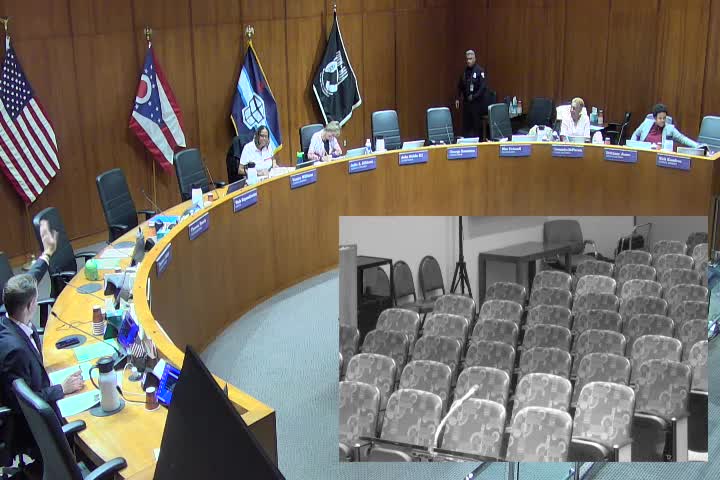Toledo reports 30,021 youth served in 2025 summer programs; council presses officials on funding, capacity
Get AI-powered insights, summaries, and transcripts
Subscribe
Summary
The Division of Youth Services told the Education, Recreation and Health Committee it recorded 30,021 youth contacts during 2025 summer programming, highlighted mentoring-focused “Thrive” offerings, and answered council questions about outside funding, drawdowns, bus-pass data and capacity-building support for nonprofit partners.
The Division of Youth Services told the Education, Recreation and Health Committee on Tuesday that its 2025 summer programming recorded 30,021 youth contacts and emphasized mentoring-focused offerings under its “Thrive” category.
The presentation, led by David Bush, commissioner for the Division of Youth Services, and Davion Beach, summarized the division’s partners, participation data and post-program survey results. The division identified 84 program partners across categories including Thrive (mentoring/leadership), Move (sports), Grow (personal/community growth), Learn (academic/career), Create (visual arts), Perform (performing arts) and Explore (outdoor learning).
The numbers and why they matter
The presenter said the 30,021 figure is not unduplicated — a single youth could be counted more than once if they attended multiple programs. Beach said the division collected 1,309 participant surveys; of those respondents, 87% said they would return to the program, 88% said they learned something, 90% said they enjoyed their program, 92% said they met a caring adult and 93% said they met a pro-social peer. The slide deck shown to council listed the top ZIP codes for youth served: 43608 (4,651 youth) and 43607 (2,728 youth). Beach noted some participants’ ZIP codes were undocumented.
Council members pressed staff on funding and sustainability. Councilwoman McPherson recounted a recent budget amendment that, she said, raised program funding from $250,000 to $1.2 million and asked whether the division is pursuing additional funding sources. Commissioner Bush said the division does not usually apply directly for external grants but assists nonprofit partners by offering letters of support and referrals; he gave TARTA (the regional transit authority) as an example of a partner that used seed money to launch its own program and then funded the bus-pass effort independently.
Drawdowns, contract deadlines and capacity building
Committee members raised concerns that some smaller partners lacked the cash flow to draw down city grants and therefore could not access funds they were awarded. Beach said seven of the 84 partners returned money because they could not complete a drawdown. He said several programs remain in contract processing and the division set an October 31 deadline for partners to finish paperwork; because the funds are general fund dollars that do not carry over, contracts not finalized by that date may be offered to other providers.
Council members also asked whether the division refers partners to the city’s Capacity Building Institute or the Community Development Department so nonprofits can improve their grant administration. Beach said the division makes referrals but that relatively few partner organizations completed the capacity-building coursework; he identified New Leaf Ministries as one program that completed the class after a referral.
Data gaps and follow-ups
Council members asked for additional or clearer data. Dr. Jones asked whether surveys ask if youth participate in other summer programs; Beach said the current survey does not but agreed it is a useful addition. McPherson asked whether the division tracks TARTA bus-pass usage; staff said the TARTA “summer blast pass” was funded and administered by TARTA this year and therefore that ridership data did not appear in the division’s reconciliation but could likely be obtained from TARTA by referral. McPherson also asked staff to check whether a $5,000 second-phase payment was received by a drone-training program that had inquired about the grant.
The division said its priority is capacity building and broader sustainability: staff told council that several programs no longer rely solely on city funding and that the division aims to distribute the general-fund money it was given for this year to the intended providers.
What’s next
Staff said they will continue to report program performance to council and that after-school programming for this year (33 programs) is drawn from the same set of 84 partners. Council members recommended the division pursue more systematic, longitudinal reporting — comparing year-to-year results — and to add survey items that identify overlap with other programs and capture parent feedback. Several council members urged more public outreach to amplify parent testimonials about program impact.
Ending
Committee members did not take a vote on any ordinance or budget during the presentation. Council members asked staff for follow-ups on TARTA ridership data, the drone program payment, the October 31 contract deadline status, and for more systematic year-to-year reporting and referrals to the Capacity Building Institute.
